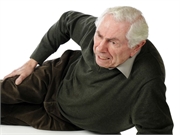To Avoid Falls, Check Your Balance
By Len CanterHealthDay Reporter

THURSDAY, Dec. 26, 2019 (HealthDay News) -- Bad balance is a common cause of dangerous falls, especially among older adults. Falls send more than 2 million adults to the emergency room every year and often result in lengthy rehab stays.
Preventing falls is a priority for staying healthy and preventing painful broken bones as you age. Easy strength and balance exercises that you can do anytime, anywhere, such as tai chi and yoga, can help you stay steady on your feet.
But first it's important to know how good (or lacking) your balance is. Grab a friend or loved one, a sturdy chair and a stopwatch to check your balance with a quick test called the single leg stance. It basically involves standing on one leg, and doctors use it to predict who might be at risk of falling.
Stand barefoot in front of the chair but don't touch it. Cross your arms. Lift one leg up off the floor and start the timer. As you feel yourself start to sway, immediately steady yourself with the chair and stop the timer.
Here are the average times that indicate good balance when you stand on one leg based on age:
- Ages 18-39: 43 seconds for men and women
- Ages 40-49: 40 seconds for men and women
- Ages 50-59: 36 seconds for women, 38 for men
- Ages 60-69: 25 seconds for women, 28 for men
- Ages 70-79: 11 seconds for women, 18 for men
- Ages 80-99: 7 seconds for women, 5 seconds for men
If you become unsteady before your specific time, talk to your doctor. Illness, medication and even footwear can throw you off balance. Together, you and your doctor can find solutions.
You can improve your balance by practicing the one-leg stance, but as a training exercise, hold onto a chair and don't let go. Lift one leg for 15 seconds, rest and repeat three times, then switch legs. The stronger your lower body, the steadier you'll be on your feet.
For safety reasons, always have someone with you when trying a balance exercise for the first time. Or consider a group balance class. Many community centers offer fun fitness programs to help adults prevent falls.
More information
The U.S. National Institute on Aging has more balance exercises you can do at home.

The news stories provided in Health News and our Health-E News Newsletter are a service of the nationally syndicated HealthDay® news and information company. Stories refer to national trends and breaking health news, and are not necessarily indicative of or always supported by our facility and providers. This information is provided for informational and educational purposes only, and is not intended to be a substitute for medical advice, diagnosis, or treatment.

